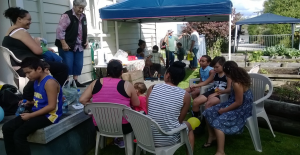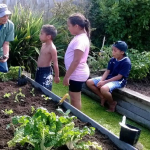




From service delivery to being of service in place
Primary health, social and education services are the focus for Tipu Ora in Rotorua.
Article prepared by Inspiring Communities’ Barbara MacLennan, February 2016.
Primary health, social and education services are the focus for Tipu Ora in Rotorua. With its home base in the beautiful village of Ohinemutu, the reach and credibility of the organisation has grown each year since being founded around three decades ago.
In a conversation with Tipu Ora Executive Manager Raewyn Bourne and Clinical Co-ordinator Evalyn Berryman, Inspiring Communites’s Barbara MacLennan learned about Kia Puawai, a new place based approach which the Trust began two years ago.
“While our funding streams all still come in silos, we’ve been working hard to integrate all the services and supports we can offer in ways that serve our community much more effectively” said Raewyn.
When statistical analysis was used to identify the best ‘fit’ for targetting new funding contracts to support populations with high birth rates and vulnerable children, Rotorua’s Western suburbs showed up as an area for attention. “We decided that instead of expecting people to come to us, or us to go to families one by one, we should actually locate ourselves in that community, and see what we could learn from working in that way.”
Three months of conversations with local community leaders created goodwill and the opportunity to locate in a building adjacent to the community health centre and other community services. Evalyn explains it was important to create an environment where whanau feel comfortable and safe, this is their home away from home. “Māori values guide this, our whare (house) kuia (nanny) role is to manaaki and awhi clients and their significant others. We build trust with whanau by listening, being consistent and transparent.” This approach appears to be working as the majority of self-referrals to the service are recommendations from friends and or whānau who have shared their own experiences accessing this service.
Raewyn describes the preparation of the new facility for opening as taking “a country mile of goodwill” from local organisations and people. She acknowledges it wasn’t all rosy at the start. A few organisations and services who are funded to work with the same populations were a bit resistant, and it took a while for both they and Kia Puawai to figure out how to ‘fit’ together well with community interests at heart. “Relationships are much better now” says Raewyn. “It’s about focussing on goals and aspirations we share, and creating systems and ways of working together that really help us keep connected, specially with the people and community we serve. In retrospect we would do some things differently in that phase of getting started, but we just had to give it a go and be brave!”
Raewyn and Evalyn talk about the enormous benefits of being located in a neighbourhood, and having a whole wealth of expertise across Tipu Ora which could be called on as needed. “Only a few of our Team are based in Western Heights every day, but our whole organisation is effectively available, and is learning from the experience.”
A lot of the work focuses on young and first time parents and includes mothercraft and homecraft programmes. “It’s great to see a young māmā whose own confidence has grown come back to the whare to help teach pregnant and other first time mums how to bathe their pēpe or share her experience of breastfeeding,” Evalyn shares. “Our Kia Puawai whare makes that possible”.
Being community-based, and well networked with other agencies serving the Western Suburbs enhances the possibility of being able to find and connect with vulnerable people and families. “It’s hard work. There’s no doubt that some just don’t want to be connected because of their own past experiences, or who they are associating with. But our chances are so much higher when we are actually there, and part of the local community fabric too. These babies and children are all of our responsibility, and the sooner we can awhi them and their whānau, and wrap the right guidance, information and support around them, the better.”
More information on Tipu Ora.


